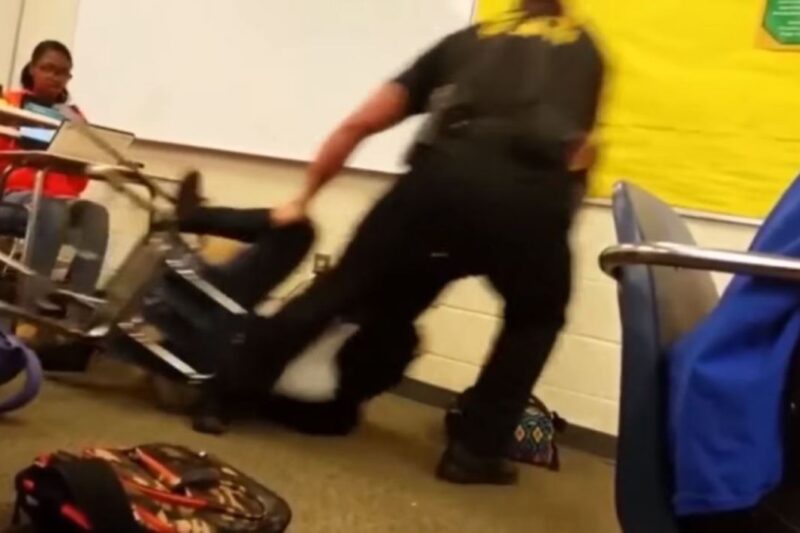
Yesterday, a surfaced of a young female African-American student at Spring Valley High School in South Carolina being put in a headlock and then slammed to the ground while sitting in her desk by a white police officer. In one quick motion, the officer proceeds to throw her across the room like a ragdoll and then handcuff her. The whimpering of the student can be heard as the officer demands, “Give me your hands. Give me your hands.” It’s awful to watch, and has understandably generated outrage from across the country.
Thanks to Black Lives Matter and other activists, we have a lens through which to understand what’s happening here: This is another disturbing example of the over-policing and brutality regularly directed at people of color by law enforcement. Calling the incident an example of “excessive force” doesn’t do justice to the casual violence on display, in a school of all places.
And yet this is how young people — and young people of color especially — are being treated in public schools across the country. In many ways, school policing mirrors policing of communities of color in general: There is a racialized presumption of guilt and a widespread use of harsh, sometimes violent, responses to minor offenses in the name of “safety.”
As police become a regular fixture in schools, “school discipline” becomes more and more their beat. What in that Spring Valley classroom is a prime example of the consequences of having a routine police presence in schools. When a student refused to hand over her cell phone or leave the classroom, officer Ben Fields was called in. Rather than calmly resolving what appeared to be a run-of-the-mill battle of wills, he chose to escalate the situation. What resulted was a shocking act of brutality. (This, however, where Fields has been accused of being unnecessarily violent with a person of color.)
The force itself is certainly notable, but what happened after is also noteworthy. Reports have been released indicating that the student was arrested for the crime of “disturbing schools.” The vague offense is a misdemeanor in South Carolina that literally makes it illegal to “disturb in any way [] the students or teachers of any school” or to “act in an obnoxious manner” at school. In other words, it makes anything from throwing a soda can to leaving the classroom without permission a crime. (And yes, we’ve heard of students being arrested for those things.)
While we lack good data on policing in the school district (Richland 2) where Spring Valley High sits – the ACLU of South Carolina just sent a FOIA request to address that problem – that Richland County has the third highest number of family court referrals for “disturbing schools” in the state.
from federal data — if this video weren’t evidence enough — that the district takes a harsh and discriminatory approach to student discipline. Seventeen percent of all secondary students are suspended out of school. Nearly one in four Black secondary students is suspended. And close to one in three Black secondary students with a disability is suspended. These numbers are unacceptably high, but unfortunately not unusual.
In reaction to these shocking events, the ACLU is demanding an end to arrests for minor misbehaviors in school, including a moratorium on arrests for the offense of “disturbing schools.” Richland County Sherriff Leon Lott and Richland 2 Superintendent Debbie Hamm must immediately develop written guidelines that return discipline to the hands of educators.
Fully cooperating with a Department of Justice investigation is an important step, but these can and should be made now.
Schools are places where young people should feel safe and welcomed. My son is white, so I have the privilege of imagining him in a classroom where he’s nurtured and treated with dignity rather than thrown to the ground by the people allegedly hired to keep him safe. When I imagine the school doors closing behind him, I feel calm, not afraid. It’s outrageous that every parent can’t do the same.
If this is what a safe school looks like, I’ll take the dangerous one.


